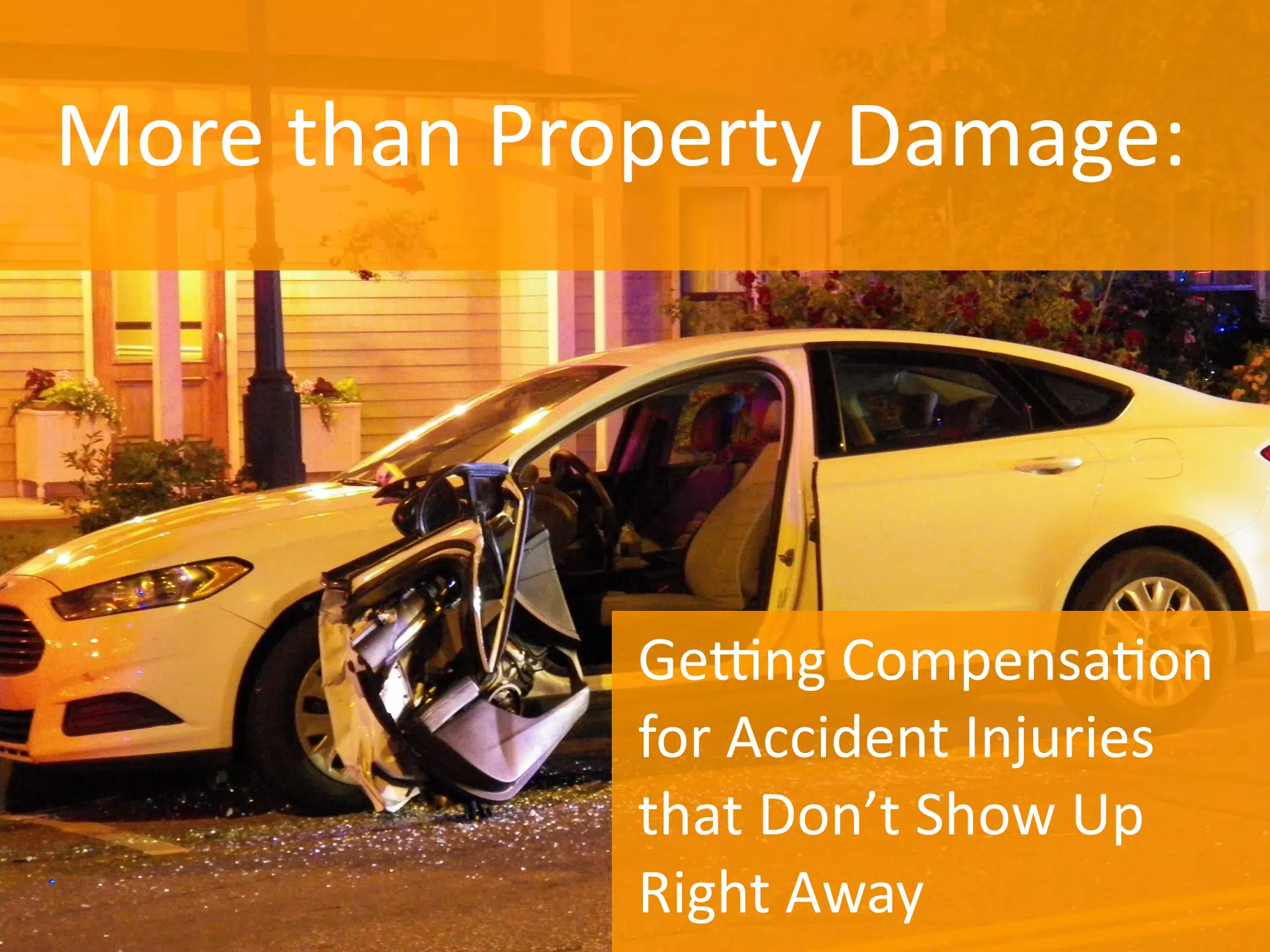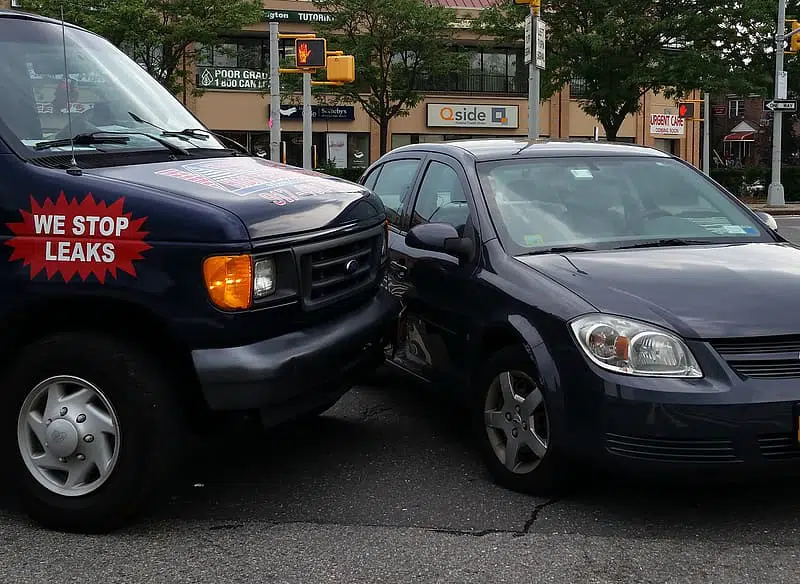More than Property Damage: Getting Compensation for Accident Injuries that Don’t Show Up Right Away

When people come to us after an accident, their main concern is often their damaged vehicle and the compensation they can get for their property damage. We understand why that is such a priority: When your car is in the shop or totaled, it can take away your ability to make a living, care for your family, and basically do all the things you need to do. And so it’s natural to want to get compensation for property damage as soon as possible.
But there is a lot more to think about if you have been in a crash. Think about it: If your car has had serious physical damage, wouldn’t your body undergo some physical damage, too? The problem is that many accident victims will feel fine at first, only to have bodily injuries show up later.
In fact it can take hours, days, or even several weeks for someone to feel the physical effects of a car accident. Injuries that do not manifest right away are called delayed onset injuries. If you’ve been in a crash that was not your fault, you deserve to be compensated for your injuries. Unfortunately, if you are too quick to accept a settlement for your car, you might miss the opportunity to be compensated for your doctor bills and medical care.
Property Damage is Immediate, but Injuries Might Be Delayed

Accidents are chaotic, stressful, and scary. There can be a lot going on and a lot of emotions to process. Immediately after a crash, a victim is usually feeling a rush of adrenaline and endorphins. This might cause them to not feel a broken bone or a cut. It’s not unusual for someone to rush to the aid of their passengers, even though they are themselves hurt. Only after things calm down a bit will the pain start to settle in.
In addition to an adrenaline rush, people might also have injuries with delayed symptoms. The nature of these injuries makes the symptoms crop up later on, sometimes weeks after the physical trauma of the crash. Or, they might feel slight discomfort that gets much worse after some time has passed.
Even when these injuries are definitely caused by the accident, because they don’t show up right away, that can be hard to prove. The insurance company or attorneys representing the person who caused the accident may argue that there is no connection, so they are not responsible for compensation. Accident victims must be on the lookout for delayed or hidden injuries, or they risk having to bear the costs all by themselves.
Delayed Symptoms and What They Could Mean
Many people come away from an accident shaken, but not visibly hurt. They may even feel fine and relieved that they aren’t bleeding and have no broken bones. It’s important to be alert for the following symptoms in the days and weeks following a wreck. They can be a sign of a serious injury that could need expensive medical treatment.
Headache. The stress of an accident alone could cause a headache, but if it doesn’t go away with some over-the-counter painkillers, or if it worsens, it could indicate a more serious issue. The victim could have a concussion, or even a traumatic brain injury or blood clot. In extreme cases, a head injury can lead to a stroke.
Neck and shoulder pain or stiffness. As cars collide, a driver might tense up his or her neck or shoulders as a natural reaction to the crash. If it doesn’t go away, it could be a sign of a soft-tissue injury like whiplash. These injuries won’t show up in an x-ray, so they can be difficult to diagnose.
Back pain. Pain in the back can be a simple strained muscle from the jolt of a car crash. When it lasts longer than a few days or gets worse, it could mean a spinal injury such as damaged nerves, sciatica, a compressed disc, or fractured vertebrae.
Abdominal pain. Being smacked by an airbag during a crash might cause some bruising and pain in the stomach. It could also be a sign of internal bleeding, though. And if the injured person is pregnant, it could mean that serious harm has been done to her baby.
Numbness. Losing feeling in the hands, arms, legs, or feet can be an indication of whiplash associated disorder or even a spinal injury. It should not be ignored if it happens in the days and weeks following an accident.
Change in personality. Friends and family may notice odd behavior from an accident victim after a crash. Forgetfulness and impaired thinking could a sign of a concussion or traumatic brain injury.
Loss of physical function. In the days following a car crash, victims should watch for physical difficulties like dizziness, a loss of balance, impaired hand-eye coordination, or blurry vision. Any of these can be a sign of a brain injury or concussion.
Mood swings or sleep disorders. It’s normal to feel out of sorts after an accident, but they may also have nightmares, depression, or anxiety. When it shows up later or lasts for a long time, it needs to be taken seriously. Crash victims can suffer from Post Traumatic Stress Disorder (PTSD) that interferes with daily life.
Never Deny Medical Assistance

Some people will turn down help from a medical professional at the scene of an accident. They might feel fine at the time. Or they don’t want to take the time or may worry about the cost of an EMT’s care or an ambulance.
But seeking medical attention right away is a good idea. Early signs of an injury that won’t fully manifest until later might be detected with an examination at the scene. These early medical records will become important in making sure they can get compensation for a delayed-onset injury.
Even if a crash does not seem serious and doesn’t require an ambulance or a rush to the emergency room, it’s still wise to visit a doctor as soon as possible. The doctor can check the person for any injuries that the victim doesn’t notice. They will also be able to instruct the patient about what to watch for in the coming days and weeks.
Having medical documentation from immediately after an accident is important if a claim for compensation must be filed. When a victim decides not to get medical attention, either at the scene or soon after a crash, insurance companies will assume there are no injuries. They will try to settle any property damage claims quickly and close the case as soon as they can.
Don’t Rush into a Settlement for Just Property Damage
While accident victims might be anxious to get compensation for their damaged vehicle, they must be cautious about accepting a property damage settlement. The insurance company will be eager to settle quickly for the least amount possible. When accepting the offer, the victim will also be required to sign a release of liability. READ IT CAREFULLY SO YOU DO NOT RELEASE YOUR INJURY CLAIM. These need to be settled separately.
This means that if the victim has suffered injuries that do not manifest right away, they will have to pay for treatment out of their own pockets. They can’t go back and request additional compensation once they have accepted a settlement.
It’s important not to rush into settling a property damage case until it is certain that there isn’t a bodily injury case too. In Illinois, accident victims have two years to file a claim. Missouri allows five years. While there’s usually no reason to wait that long, waiting for a few weeks or even a few months is recommended. This way, a more accurate estimate can be made of how much compensation will be needed to take care of not only the damaged property, but also any losses due to an injury.
To deal with the immediate need for transportation while waiting for a settlement, insurance policies will typically cover the cost of a rental car or other transportation. Uninsured or Underinsured Motorist coverage can be a worthwhile addition to a policy in ensuring coverage for these types of expenses.
The Need for a Lawyer in Bodily Injury vs. Property Damage Cases

Some property damage claims are easily handled by an individual with the insurance company. Getting compensation for a simple fender-bender might not require calling a lawyer.
But if the property damage is extensive, or if bodily injury is involved, it is best to consult with an attorney. Experienced personal injury lawyers like Hipskind & McAninch will help by:
- Consulting on the signs of injury you need to watch for
- Proving your delayed-onset injuries were caused by the crash
- Calculating what your injury will cost in current and future medical expenses
- Computing lost wages and loss of future earnings due to an accident
- Assessing the value of your changed quality of life.
The purpose of compensation after an accident is to “make whole” meaning to repay the victim for everything they have lost. When it comes to personal injury, that means not only cuts, bruises, and broken bones, but also those injuries that might not manifest right away.
Category:
Car Accidents, Serious Injuries
Tags:
car accident, car accident claims, car accident settlements, delayed onset injuries, property damage